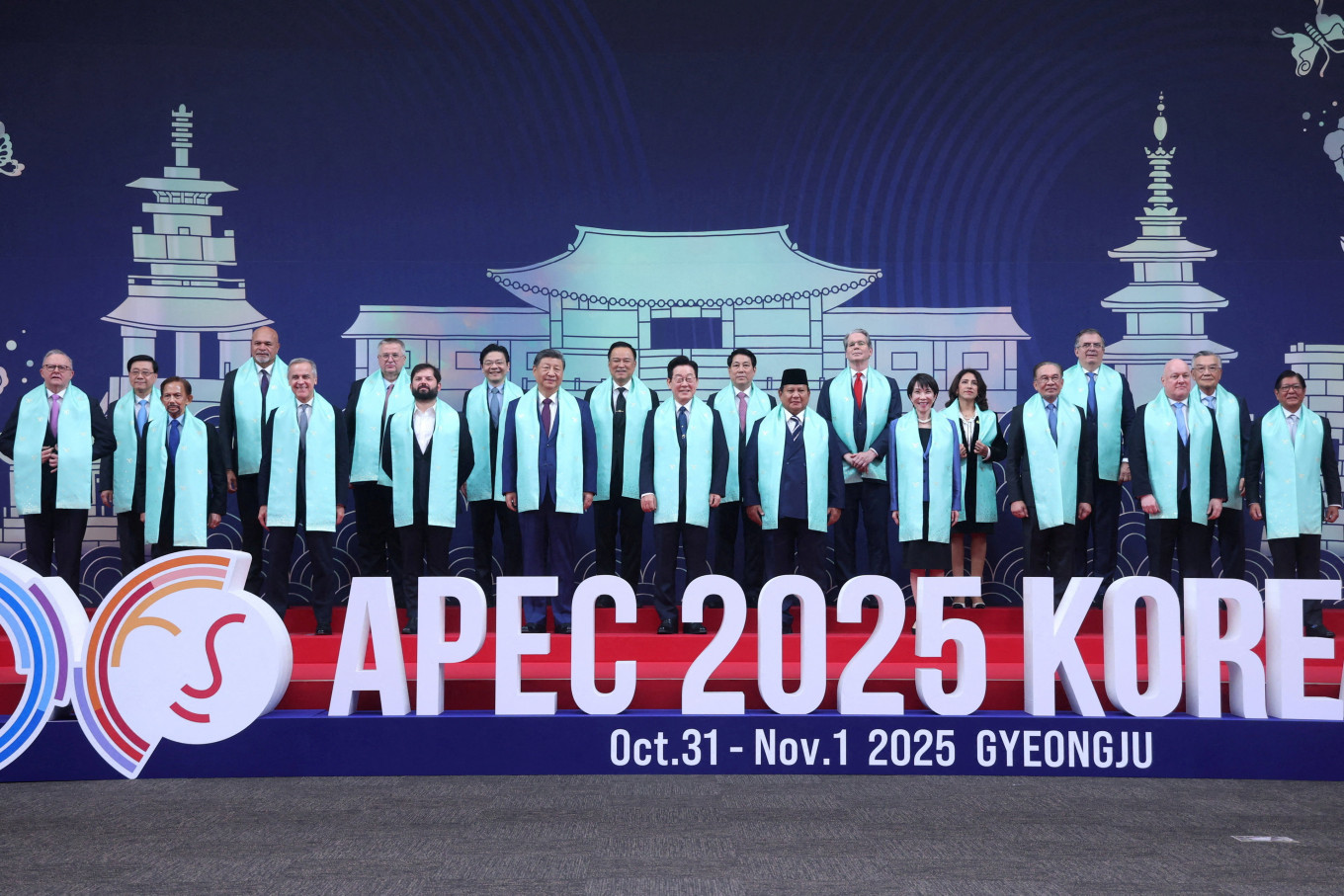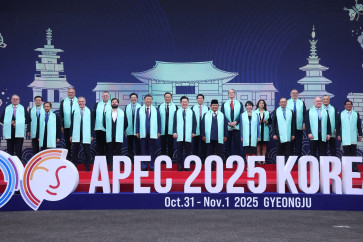Popular Reads
Top Results
Can't find what you're looking for?
View all search resultsPopular Reads
Top Results
Can't find what you're looking for?
View all search resultsLeveraging ASEAN, APEC 2025 outcomes to accelerate economic growth
Despite Indonesia’s strong regional position, this growth framework is shared by all economies in the region and each pursuing it for their own prosperity. Indonesia must act now to seize opportunities.
Change text size
Gift Premium Articles
to Anyone
 Australia's Prime Minister Anthony Albanese (from left), Brunei's Sultan Hassanal Bolkiah, Canada's Prime Minister Mark Carney, Chile's President Gabriel Boric, China's President Xi Jinping, South Korea's President Lee Jae-myung, Indonesia's President Prabowo Subianto, Japan's Prime Minister Sanae Takaichi, Malaysia's Prime Minister Anwar Ibrahim, New Zealand's Prime Minister Christopher Luxon, Philippines' President Ferdinand Marcos Jr., Hong Kong's Chief Executive John Lee, Papua New Guinea's Deputy Prime Minister John Rosso, Russia's Deputy Prime Minister for International Affairs Alexei Overchuk, Singapore's Prime Minister Lawrence Wong, Thailand's Prime Minister Anutin Charnvirakul, Vietnam's President Luong Cuong, United States' Treasury Secretary Scott Bessent, Peru's Minister of Foreign Trade and Tourism Teresa Mera, Mexico's Minister of Economy Marcelo Ebrard, and Taiwan's Senior Advisor Lin Hsin-i pose for a group photo during the Asia-Pacific Economic Cooperation (APEC) summit in Gyeongju, South Korea, Nov. 1, 2025. (Yonhap via REUTERS /Yonhap via REUTERS )
Australia's Prime Minister Anthony Albanese (from left), Brunei's Sultan Hassanal Bolkiah, Canada's Prime Minister Mark Carney, Chile's President Gabriel Boric, China's President Xi Jinping, South Korea's President Lee Jae-myung, Indonesia's President Prabowo Subianto, Japan's Prime Minister Sanae Takaichi, Malaysia's Prime Minister Anwar Ibrahim, New Zealand's Prime Minister Christopher Luxon, Philippines' President Ferdinand Marcos Jr., Hong Kong's Chief Executive John Lee, Papua New Guinea's Deputy Prime Minister John Rosso, Russia's Deputy Prime Minister for International Affairs Alexei Overchuk, Singapore's Prime Minister Lawrence Wong, Thailand's Prime Minister Anutin Charnvirakul, Vietnam's President Luong Cuong, United States' Treasury Secretary Scott Bessent, Peru's Minister of Foreign Trade and Tourism Teresa Mera, Mexico's Minister of Economy Marcelo Ebrard, and Taiwan's Senior Advisor Lin Hsin-i pose for a group photo during the Asia-Pacific Economic Cooperation (APEC) summit in Gyeongju, South Korea, Nov. 1, 2025. (Yonhap via REUTERS /Yonhap via REUTERS )
T
he ASEAN Leaders' Summit in Kuala Lumpur and the Asia-Pacific Economic Cooperation (APEC) Economic Leaders' Meeting in Gyeongju, South Korea, concluded with outcomes that offer Indonesia strategic roadmaps for accelerated economic growth.
For business, the most compelling takeaway is not the differences between the two forums, but their profound alignment in the region’s future economic pathways.
Two landmark 2025 declarations, the Kuala Lumpur Declaration on ASEAN 2045: Our Shared Future, and the APEC Leaders' Gyeongju Declaration, may fundamentally reshape Indonesia's economic trajectory for the next two decades.
Both articulate unified regional priorities: sustainability, connectivity and digitalization. When properly leveraged, this convergence offers Indonesia unique opportunities to benefit from its strategic location, young workforce and natural resources to advance its economic growth agenda, particularly industrialization and human capital development.
But seizing these opportunities requires moving beyond paper commitments. At this critical economic juncture, the region’s pursuit of sustainability, connectivity and digitalization confronts Indonesia with both challenges and opportunities. The question is how Indonesia can translate these regional commitments into real competitive advantages.
There are several steps to realize the commitments into actions. First is to accelerate green sustainable adoption. ASEAN and APEC emphasis on sustainability solidifies the global shift toward a green economy. APEC’s commitment to the energy transition and ASEAN’s focus on the blue economy and the Asia Zero Emission Community (AZEC) are not mere environmental talking points.
They signal growing preference for sustainable business practices and potential future discrimination against high-emission industries. They also reflect shifting global capital flows, as investors, buyers and banks in both ASEAN and APEC regions are now gradually and explicitly mandated to de-risk their portfolios by prioritizing green investments.


















